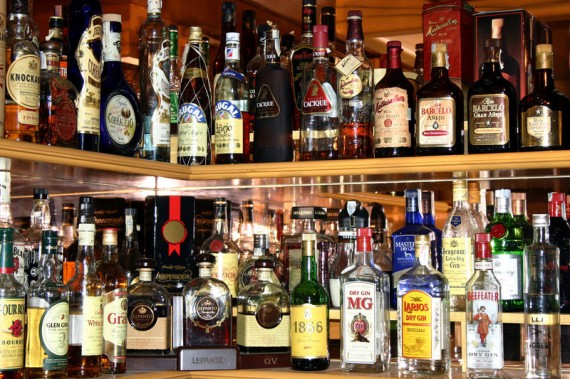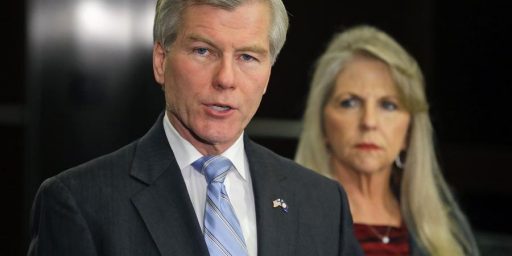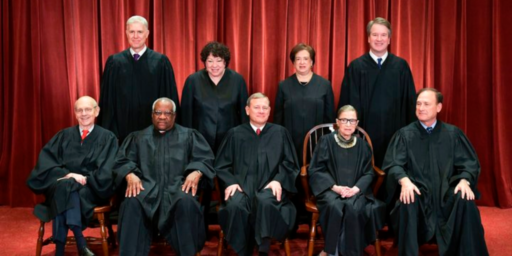Virginia Privatizing Alcohol Sales?
Virginia's governor wants the state to get out of the liquor business after 76 years. It's about time.
If the governor gets his way, my home state will get out of the liquor business after 76 years.
For months, aides to Virginia Gov. Robert F. McDonnell have been meeting behind closed doors with alcohol retailers and wholesalers, public safety officials and faith-based groups to come up with a way to fulfill one of the governor’s most notable campaign promises: privatizing the state’s liquor stores.
The consequences of what they come up with are potentially enormous and would amount to one of the most noticeable changes in the relationship between Virginians and their government in years, if not decades.
For the drinking-age public, a privatized system could mean many more liquor stores, a much wider variety of libations and lower prices. Like beer and wine, liquor could be sold in grocery stores, big-box stores such as Wal-Mart or anywhere else a licensed dealer chooses to locate. For the state’s ailing transportation network, it would mean a jolt of fresh cash that McDonnell (R) urgently needs as part of his plan to fix roads. Two of McDonnell’s other primary sources of new money for transportation — drilling offshore and tolling interstate highways — are highly unlikely to generate any money anytime soon.
And for McDonnell, who opposes government-run liquor stores on free-market principles, bringing Democrats and Republicans together on a major issue would show that he can deliver on his promises and be the kind of bipartisan leader he has pledged to be.
Del. David B. Albo (R-Fairfax), who supports privatization, said changing the way Virginia sells alcohol after 76 years would be a huge victory for McDonnell, the General Assembly and Virginia. “It’s going to be a big deal if it happens,” Albo said. “We’ve been doing it the same way since Prohibition.”
But making it happen will be anything but easy. Alcohol sales bring in about $220 million a year, and many lawmakers — particularly the Democrats who hold a majority in the state Senate — are unwilling to support privatization unless it generates much more than that. Many others, including some religious conservatives in McDonnell’s party, are fearful that privatizing alcohol sales will lead to a glut of liquor stores and a rise in drunken driving and other alcohol-related problems.
There’s no earthly reason the state government should be in the business of retail sales. I have no issue with licensing and closely regulating alcoholic beverages, the misuse of which can impose serious negative externalities on society, but am baffled by the idea that the Commonwealth needs to actually own the stores.







Yet, the combination of ardent drys and public employee unions keep it from happening.
Wow, it’s possible to blame public employee unions for everything. Good work, Walt!
Is an organization standing up for its members a bad thing?
Make the bill revenue neutral (you can’t) and then we can talk, otherwise you belong with Kyl, Mitch and the rest of the GOP with your budget disfunctionality.
Make the bill revenue neutral (you can’t) and then we can talk, otherwise you belong with Kyl, Mitch and the rest of the GOP with your budget disfunctionality.
First, there are times when principle should trump the ability to generate revenue for the state.
Second, there’s no reason this can’t be revenue neutral. Presumably, running a network of liquor stores is an expensive proposition. Outsourcing that while skimming the profits of those running private stores could easily be more lucrative. And we typically tax luxury “sin” items at a higher rate.
Mr. Joyner wrote:
I have no issue with licensing and closely regulating alcoholic beverages, the misuse of which can impose serious negative externalities on society . . .
I fully agree that the state has no business running retail liquor stores. However, I am baffled by your comment above. What do the current licensing and regulatory activities do to reduce those alleged “negative externalities”?
There’s no earthly reason the state government should be in the business of retail sales.
I can think of a reason.
When the product being sold is something that is probably deleterious but the consequences of banning it are even worse. In that case, you can make the argument that the product should be sold legally but in the most expensive and inefficient way possible that does not allow criminal sales to thrive yet discourages consumption.
I am not sure that liquor actually falls into that category of deleterious substance but it is certainly something that has room for debate. I would propose that hard drugs also be sold in government stores staffed with arrogant and indolent drones with inconvenient hours and that are closed on all government holidays, including Columbus Day and Martin Luther King’s birthday.
Another argument in favor of these stores is that they provide a place for politicians to park their idiot brothers in law without the concern that they cannot perform their jobs competently. As long as the stores don’t lose money, they allow politicians to engage in graft without interfering with the parts of government that we actually want to work.
Raoul asserted:
Make the bill revenue neutral (you can’t) and then we can talk, otherwise you belong with Kyl, Mitch and the rest of the GOP with your budget disfunctionality
Yes, I can just imagine Jefferson Davis, the President of the Confederacy, telling those advocating abolition, “When you can make the ending of slavery revenue neutral to the South, we can talk, otherwise you belong with Lincold and the rest of the GOP with your economic disfuntionality….”
And we can see the nature of the Obama administration’s strategy in the assertions of Raoul — jack up government spending to outrageous levels, then treat it is as sacrosanct and not to be questioned — treat it as an unchangable absolute that justifies whatever level of looting is required to sustain it.
Mark in Texas wrote:
I can think of a reason.
When the product being sold is something that is probably deleterious but the consequences of banning it are even worse. In that case, you can make the argument that the product should be sold legally but in the most expensive and inefficient way possible that does not allow criminal sales to thrive yet discourages consumption.
That argument is false.
The mere fact that a product may be “deleterious” beyond a certain dose or intake does not justify banning it or placing it under state control. Indeed, food itself is “deleterious” beyond a certain level of intake — and water is absolutely deadly if misused.
My life belongs to me — not to the state, and not to “society” — and if I wish to do something “deleterious” to it, that’s no one’s business but my own (provided, of course, that in the process I do not violate the rights of others).
Nor is this principle altered by the claim that consuming “deleterious” substances drives up “society’s” healthcare costs. Any healthcare costs incurred as a result of my intake of “deleterious” substances remains MY responsibility — like ALL of my healthcare costs are, properly, my responsibility. I, and I alone, should be responsible for paying those costs. The fact that the state has erected a coercive system that lets some individuals escape this responsibility by forcing others to pay their doctor bills is not a justification for violating my rights to consume what I wish by threatening to make others pay the resulting healthcare costs. Two wrongs don’t make a right — and the first wrong, the act of forcing one man to pay another man’s doctor bills, does not justify a second wrong, the wrong of violating my right to consume what I choose.
What do the current licensing and regulatory activities do to reduce those alleged “negative externalities”?
They regulate who can sell alcohol legally, and thus curbs the sale to minors, and collect substantial taxes, which can help pay for the externalities.
But let’s turn it around: What does a state liquor store do to curb the externalities that a private store wouldn’t? I can go buy a dozen bottles of hard liquor at the ABC store anytime I please. The only difference is that the cashier collects a paycheck from the state and, if they decide not to carry a particular product, it’s unavailable to those who can’t easily drive to DC or Maryland. (I happen to have a DC liquor store around the corner from my office, so I’ve got an outlet if needed.)
Michael Smith
That argument is false.
No, you just don’t like the argument because it is contrary to your absolutist libertarian beliefs. Nothing wrong with you believing that, just don’t assume that your faith is universally shared. We are social creatures and many of our choices affect others than ourselves. If you think that substance abuse affects only the individual consuming the substance, you have not had a family member in that situation.
Prohibition causes more problems than it solves but we are probably not better off if the strength of market forces are put to work to encourage consumption of things that have a proven record of causing people’s lives to get worse with increased consumption. Rather than encouraging consumption by allowing the private sector to distribute deleterious substances efficiently, or coping with the crime and corruption problems created by prohibition, the least harmful policy might be to distribute harmful substances in the most inefficient method possible i.e. having the government do it.
You’re going to have to make a really good argument as to how the inefficiencies of the gov’t are keeping us ignorant masses from hurting ourselves in order for me to support keeping the ABC stores going.
If expensive booze is all that’s keeping us ignorant proles from drinking a quart of rum and sliding into a bus stop, why don’t you let private industry do it and slap a tax on hard liquor? More efficient government and sufficiently inefficient booze sales. Win-win!
JJ: I appreciate you responding. For me the larger principle is fiscally sound government, whether booze is sold through exclusive licensing agreements or the government I really don’t care. Sadly, none of the ideas that would make the proposal revenue neutral are on the table. MS: Nice equating slavery with state run booze sales.
To me the entire concept of a state run liquor store is foreign.
I believe I first experienced it on a trip to Philly.
Then again, the idea that it could be illegal to sell liquor on Sundays is absurd as well. And are there any 80,000 square foot liquor stores in VA?
Because we have one! http://www.specsonline.com/
Visited my parents for New Years. The state run liquor stores were closed at 5:00 on new years eve. That’s all you need to know about the intelligence of government planning.
Semper Why
As Jeremy points out, higher prices are not the only thing restricting sales at government liquor stores. Private industry will do everything possible to provide a profitable product to people who can pay for it. Government workers don’t care.
Not only will hours be restricted on New Years Eve but you are likely to find the the stores closed on Columbus Day, Cinco de Mayo, President’s Day, Eid, Yom Kippur , Martin Luther King’s birthday, Diwali, Purim, St.Patrick’s Day, the feast of the Epiphany, Rosh Hashana, International Day of the Woman, St.Crispin’s Day, Shrove Tuesday, Arbor Day, Criminon Day, ANZAC Day, or any other government holiday.
Most people are deterred from drinking and driving by self preservation and their moral reluctance to put others at risk.
My personal feeling is that state liquor stores ought to be a model that is used to sell heroin, cocaine, oxycontin, and other drugs that are currently illegal or highly restricted in order to reduce the money that flows into criminal organizations and corrupt police and politicians while minimizing the expansion of use that would result from legalization.